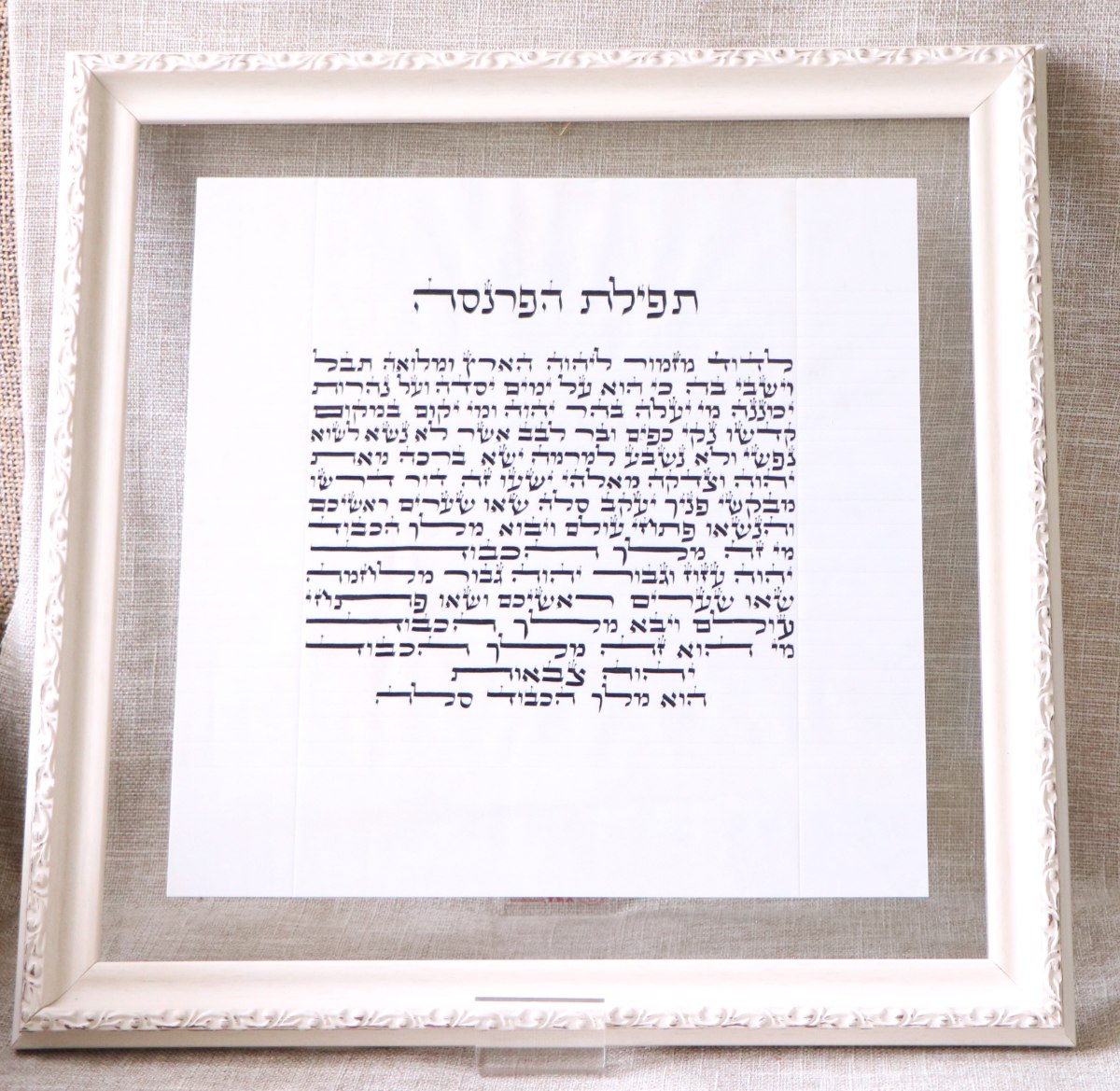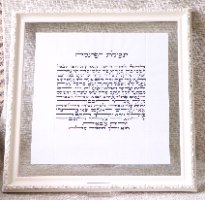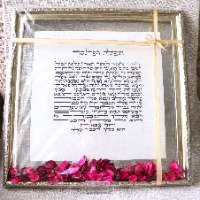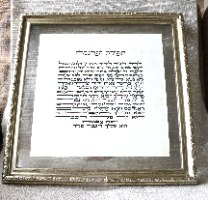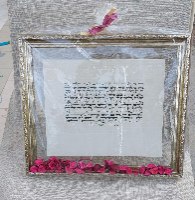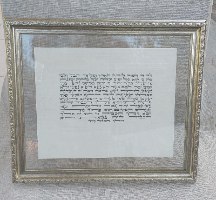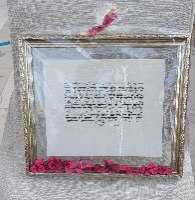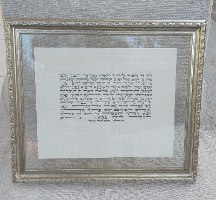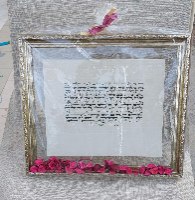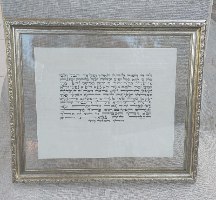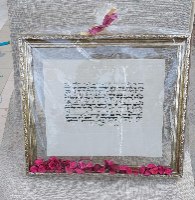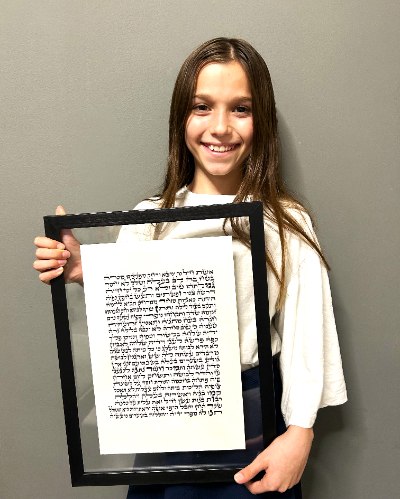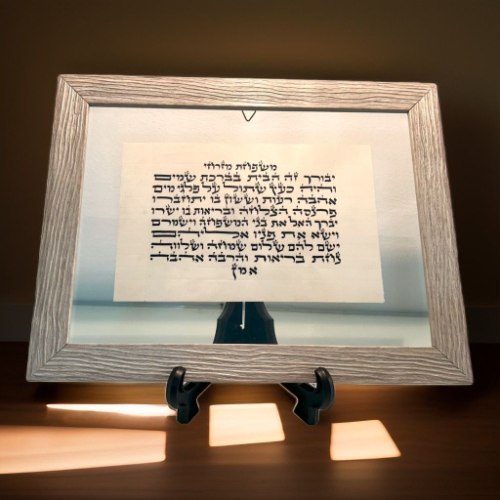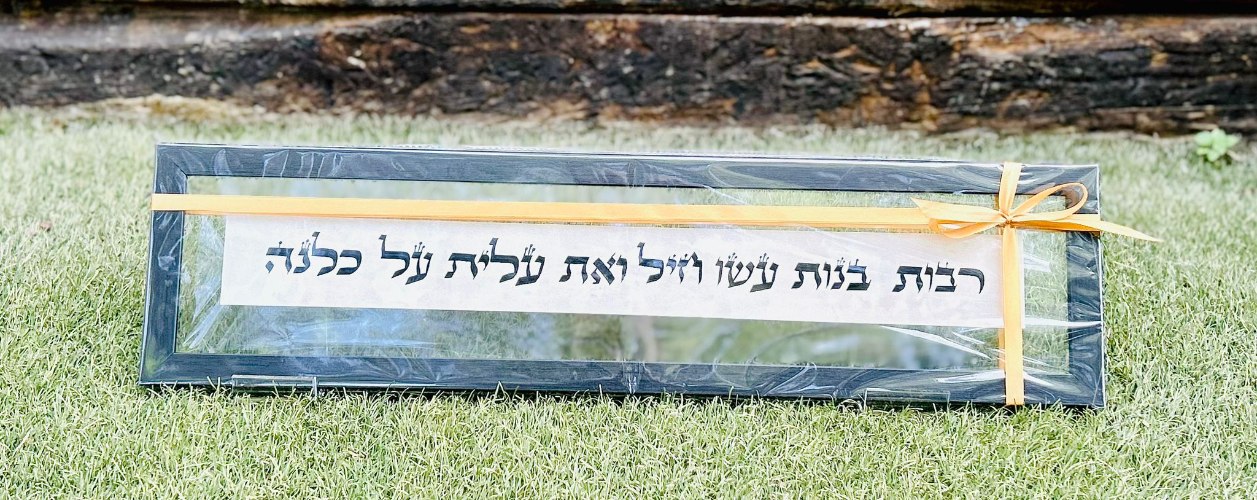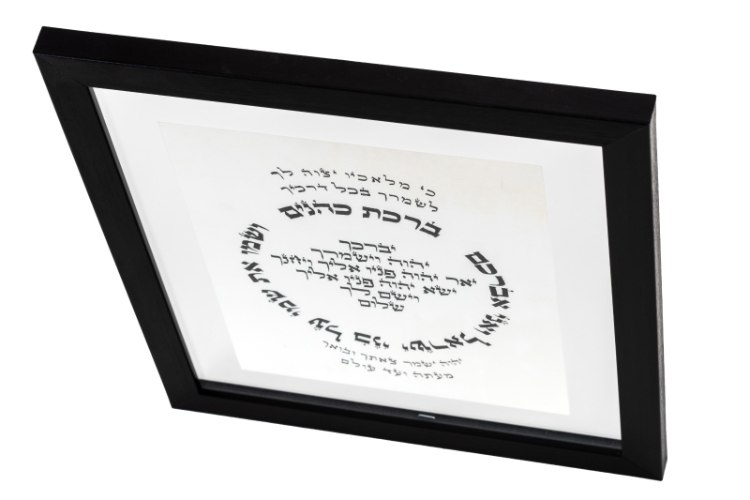תפילת הפרנסה גדול
FKUS5O54XK
-
₪1,110.00₪1,170.00
-
אפשרויות:1. בחירת מסגרת רצויה לכיתוב:
![רוגע - תפילת הפרנסה גדול]() רוגע
רוגע![קבלה - תפילת הפרנסה גדול]() קבלה
קבלה![פשטות - תפילת הפרנסה גדול]() פשטות
פשטות![פרנסה - תפילת הפרנסה גדול]() פרנסה
פרנסה![סבלנות - תפילת הפרנסה גדול]() סבלנות
סבלנות![נתינה - תפילת הפרנסה גדול]() נתינה
נתינה![משפחה - תפילת הפרנסה גדול]() משפחה
משפחה![הכלה - תפילת הפרנסה גדול]() הכלה
הכלה![דעת - תפילת הפרנסה גדול]() דעת
דעת![גאולה - תפילת הפרנסה גדול]() גאולה
גאולה![בריאות - תפילת הפרנסה גדול]() בריאות
בריאות![אמונה - תפילת הפרנסה גדול]() אמונה
אמונה![אחדות - תפילת הפרנסה גדול]() אחדות
אחדות![אושר - תפילת הפרנסה גדול]() אושר
אושר![אור - תפילת הפרנסה גדול]() אור
אור![אהבה - תפילת הפרנסה גדול]() אהבה
אהבה![שפע - תפילת הפרנסה גדול]() שפע
שפע![שמחה - תפילת הפרנסה גדול]() שמחה
שמחה![שלווה - תפילת הפרנסה גדול]() שלווה
שלווה![שכינה - תפילת הפרנסה גדול]() שכינה
שכינה![תשובה - תפילת הפרנסה גדול]() תשובה
תשובה![תקווה - תפילת הפרנסה גדול]() תקווהבחרו אפשרות אחת לפחות
תקווהבחרו אפשרות אחת לפחות
אזל המלאי
פריט זה ניתן על ידי קרדיטים.
לחצו על "הוספה לעגלה" להמשך
לחצו על "הוספה לעגלה" להמשך
אזל המלאי עבור /
משלוח חינם מעל ₪500.00
תהילים כ"ד -תפילת הפרנסה
שיר של יום ראשון שנהגו לומר הלויים בבית המקדש
קריאת פרק כד בתהלים מומלצת בספרי הסגולות כמועילה לפרנסה טובה.
המזמור פותח בהצהרה שכל היקום כולו נברא על ידי הקב"ה, והוא הבעלים היחידי של העולם ומה שיש בו.
עם זאת, אין נוכחותו של הקב"ה מורגשת בכל מקום בשווה, אלא ישנו מקום מיוחד (גאוגרפי או לחלופין רוחני-תודעתי) שבו ניתן כביכול "לפגוש" את ה' באופן מורגש יותר, ואל המקום הזה אין להיכנס ללא השגת דרגה רוחנית ראויה מבחינת התנהגות טובה וישרה, לב טהור ודבקות באמת.
אדם כזה יכול להביא ברכה אל העולם כתוצאה מהמפגש.
נהוג לקרוא מזמור זה:
-- כשיר של יום ראשון עם סיום תפילת שחרית, כזיכרון לשירת הלוויים בשעת ניסוך היין בבוקר ובערב בבית המקדש.
-- בקהילות האשכנזים, נאמר במהלך הובלת ספר התורה להיכל, לאחר סיום קריאת התורה בימי חול ובימים טובים, וכן במנחה של שבת.
-- ארבעת הפסוקים האחרונים של המזמור, הם חלק מקבוצת פסוקי המלכויות בתפילת מוסף של ראש השנה, המפארים את ה' כמלך על כל הארץ, ועוסקים במלכותו במהלך הדורות.
-- בקהילות הספרדים, נאמר לאחר תפילת ערבית ותפילת מוסף בראש השנה וביום הכיפורים, כאשר ארון הקודש פתוח, כחלק מתפילה על הפרנסה.
-- על פי קבלת האר"י, נאמר בכוונה, פסוק פסוק, על ידי החזן, כשהציבור חוזר אחריו, בסוף תפילת ערבית של שני לילי ראש השנה, וליל כל נדרי.
-- נאמר אף ביחידות, על ידי מי שמתעורר לומר תיקון חצות, בחלקו השני של התיקון - תיקון לאה.
שיר של יום ראשון שנהגו לומר הלויים בבית המקדש
קריאת פרק כד בתהלים מומלצת בספרי הסגולות כמועילה לפרנסה טובה.
המזמור פותח בהצהרה שכל היקום כולו נברא על ידי הקב"ה, והוא הבעלים היחידי של העולם ומה שיש בו.
עם זאת, אין נוכחותו של הקב"ה מורגשת בכל מקום בשווה, אלא ישנו מקום מיוחד (גאוגרפי או לחלופין רוחני-תודעתי) שבו ניתן כביכול "לפגוש" את ה' באופן מורגש יותר, ואל המקום הזה אין להיכנס ללא השגת דרגה רוחנית ראויה מבחינת התנהגות טובה וישרה, לב טהור ודבקות באמת.
אדם כזה יכול להביא ברכה אל העולם כתוצאה מהמפגש.
נהוג לקרוא מזמור זה:
-- כשיר של יום ראשון עם סיום תפילת שחרית, כזיכרון לשירת הלוויים בשעת ניסוך היין בבוקר ובערב בבית המקדש.
-- בקהילות האשכנזים, נאמר במהלך הובלת ספר התורה להיכל, לאחר סיום קריאת התורה בימי חול ובימים טובים, וכן במנחה של שבת.
-- ארבעת הפסוקים האחרונים של המזמור, הם חלק מקבוצת פסוקי המלכויות בתפילת מוסף של ראש השנה, המפארים את ה' כמלך על כל הארץ, ועוסקים במלכותו במהלך הדורות.
-- בקהילות הספרדים, נאמר לאחר תפילת ערבית ותפילת מוסף בראש השנה וביום הכיפורים, כאשר ארון הקודש פתוח, כחלק מתפילה על הפרנסה.
-- על פי קבלת האר"י, נאמר בכוונה, פסוק פסוק, על ידי החזן, כשהציבור חוזר אחריו, בסוף תפילת ערבית של שני לילי ראש השנה, וליל כל נדרי.
-- נאמר אף ביחידות, על ידי מי שמתעורר לומר תיקון חצות, בחלקו השני של התיקון - תיקון לאה.
-
זמן אספקה ותנאי רכישהמשלוח המוצרים מתבצע ע"י דואר ישראל
סכום דמי המשלוח (במידה וקיים) יופיע במהלך הרכישה וייגבה בעת ביצוע ההזמנה
זמן השילוח תלוי בדואר ישראל וכל עיכוב כתוצאה מפעילות לא תקינה של דואר ישראל איננה באחריותינו
זמן האספקה הינו עד 14 ימים, אנו נעשה כל שביכולתנו לספק את המוצרים הרבה לפני כן
המשלוח יוכל להתבצע באחת מהדרכים הבאות (לפי בחירת הלקוח):
• דואר ישראל – משלוח רגיל
• דואר רשום
• דואר אקספרס מסניף לדלת
• איסוף עצמי
** המחירים מחושבים ביחס משקל המוצר
-
מדיניות החזרת מוצריםביטול עסקה יעשה תוך 14 ימים מיום קבלת המוצר.
הודעה על הביטול תעשה בכתב באמצעות דוא"ל, פקס, דואר או במסירה ידנית.
באם החלטת לבטל את הזמנתך שלא בגלל חריגה מזמני אספקה, פגם בייצור המוצר או אי התאמה בין המוצר שהוזמן למוצר שסופק בפועל,
יחולו דמי ביטול בשיעור של 5% מגובה העסקה או 100 ש"ח - הנמוך מבניהם כקבוע בחוק והמוצר יוחזר על חשבון הלקוח.
בביטול עסקה שבוצעה בכרטיס אשראי ישנה עמלה של כרטיס אשראי .
ביטול העסקה יתבצע בתנאי שהמוצר לא נפגם, הווה אומר, טובין הארוז באריזתו המקורית ובלבד שאריזתו לא נפתחה על ידי הצרכן.
** ביטול העסקה הינו רלוונטי מרגע ביצוע העסקה - המוצר הינו יחודי ומותאם לבקשת הלקוח ולכן לא יתאפשר החזר מלא מרגע הזמנת המוצר.
אריזה מקורית- "חפץ וכל חומר שהוא המשמש את היצרן או היבואן, כעטיפה למוצר שייצר או שייבא ושאינו מהווה חלק בלתי נפרד מהמוצר ואינו חיוני לצורך שימוש במוצר".
Min Hastam תמסור ללקוח אישור על ביטול הזמנה
תהילים כ"ד -תפילת הפרנסה - גדול מאוד
שיר של יום ראשון שנהגו לומר הלויים בבית המקדש
קריאת פרק כד בתהלים מומלצת בספרי הסגולות כמועילה לפרנסה טובה.
המזמור פותח בהצהרה שכל היקום כולו נברא על ידי הקב"ה, והוא הבעלים היחידי של העולם ומה שיש בו.
עם זאת, אין נוכחותו של הקב"ה מורגשת בכל מקום בשווה, אלא ישנו מקום מיוחד (גאוגרפי או לחלופין רוחני-תודעתי) שבו ניתן כביכול "לפגוש" את ה' באופן מורגש יותר, ואל המקום הזה אין להיכנס ללא השגת דרגה רוחנית ראויה מבחינת התנהגות טובה וישרה, לב טהור ודבקות באמת.
אדם כזה יכול להביא ברכה אל העולם כתוצאה מהמפגש.
נהוג לקרוא מזמור זה:
-- כשיר של יום ראשון עם סיום תפילת שחרית, כזיכרון לשירת הלוויים בשעת ניסוך היין בבוקר ובערב בבית המקדש.
-- בקהילות האשכנזים, נאמר במהלך הובלת ספר התורה להיכל, לאחר סיום קריאת התורה בימי חול ובימים טובים, וכן במנחה של שבת.
-- ארבעת הפסוקים האחרונים של המזמור, הם חלק מקבוצת פסוקי המלכויות בתפילת מוסף של ראש השנה, המפארים את ה' כמלך על כל הארץ, ועוסקים במלכותו במהלך הדורות.
-- בקהילות הספרדים, נאמר לאחר תפילת ערבית ותפילת מוסף בראש השנה וביום הכיפורים, כאשר ארון הקודש פתוח, כחלק מתפילה על הפרנסה.
-- על פי קבלת האר"י, נאמר בכוונה, פסוק פסוק, על ידי החזן, כשהציבור חוזר אחריו, בסוף תפילת ערבית של שני לילי ראש השנה, וליל כל נדרי.
-- נאמר אף ביחידות, על ידי מי שמתעורר לומר תיקון חצות, בחלקו השני של התיקון - תיקון לאה.
שיר של יום ראשון שנהגו לומר הלויים בבית המקדש
קריאת פרק כד בתהלים מומלצת בספרי הסגולות כמועילה לפרנסה טובה.
המזמור פותח בהצהרה שכל היקום כולו נברא על ידי הקב"ה, והוא הבעלים היחידי של העולם ומה שיש בו.
עם זאת, אין נוכחותו של הקב"ה מורגשת בכל מקום בשווה, אלא ישנו מקום מיוחד (גאוגרפי או לחלופין רוחני-תודעתי) שבו ניתן כביכול "לפגוש" את ה' באופן מורגש יותר, ואל המקום הזה אין להיכנס ללא השגת דרגה רוחנית ראויה מבחינת התנהגות טובה וישרה, לב טהור ודבקות באמת.
אדם כזה יכול להביא ברכה אל העולם כתוצאה מהמפגש.
נהוג לקרוא מזמור זה:
-- כשיר של יום ראשון עם סיום תפילת שחרית, כזיכרון לשירת הלוויים בשעת ניסוך היין בבוקר ובערב בבית המקדש.
-- בקהילות האשכנזים, נאמר במהלך הובלת ספר התורה להיכל, לאחר סיום קריאת התורה בימי חול ובימים טובים, וכן במנחה של שבת.
-- ארבעת הפסוקים האחרונים של המזמור, הם חלק מקבוצת פסוקי המלכויות בתפילת מוסף של ראש השנה, המפארים את ה' כמלך על כל הארץ, ועוסקים במלכותו במהלך הדורות.
-- בקהילות הספרדים, נאמר לאחר תפילת ערבית ותפילת מוסף בראש השנה וביום הכיפורים, כאשר ארון הקודש פתוח, כחלק מתפילה על הפרנסה.
-- על פי קבלת האר"י, נאמר בכוונה, פסוק פסוק, על ידי החזן, כשהציבור חוזר אחריו, בסוף תפילת ערבית של שני לילי ראש השנה, וליל כל נדרי.
-- נאמר אף ביחידות, על ידי מי שמתעורר לומר תיקון חצות, בחלקו השני של התיקון - תיקון לאה.
חוות דעת

מאוד מרוצה מהשירות קודם כל והדברים מדויקים וכתובים כראוי
אהלן יהודה היקר מספר פעמים שאני מזמין ממך כיתבי קודש של מזמורי תהילים ואני מאוד מרוצה מהשירות קודם כל והדברים מדויקים וכתובים כראוי לציין שאני יחזור לקנות ממך בעזרת השם תודה על הכל
נתנאל סיבוני
תגובות
מוצרים קשורים
הוספת חוות דעת
חוות הדעת נשלחה בהצלחה.
חוות הדעת נמצאת בבדיקה וממתינה לאישור שלנו לפרסום באתר.
תודה על השיתוף
קיבלתם הנחת שיתוף מיוחדת! על מנת להינות מהנחה זו עליכם להוסיף את הפריט לעגלת הקניות בכפתור הוספה לעגלה.
הצטרפו לרשימת המתנה לחזרה למלאי
הצטרפות לרשימת ההמתנה בוצעה בהצלחה.
אנו נשלח אליכם מייל כאשר הפריט יחזור למלאי.

